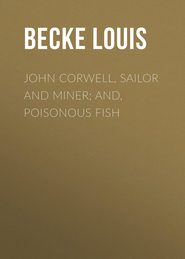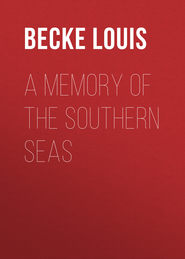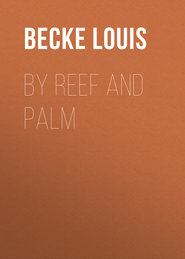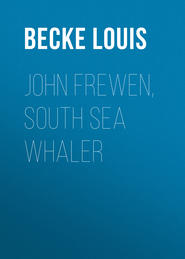По всем вопросам обращайтесь на: info@litportal.ru
(©) 2003-2024.
✖
Tom Gerrard
Настройки чтения
Размер шрифта
Высота строк
Поля
Douglas Fraser was a widower, his wife having died when Kate was only four years of age. She was now nineteen, and had been her father’s constant companion and helpmate ever since the death of her mother. Fraser, who to all appearance was only the ordinary type of working miner common to all Australasian gold-fields, was in reality a highly-educated man, who had been not only a successful barrister, but a judge of the District Court of New South Wales. The death of his wife, however, to whom he was passionately devoted, changed the whole course of his existence. Resigning his appointment, he withdrew himself absolutely from all society, sold his house and such other property as he possessed, and then, to the astonishment of his many warm friends, disappeared with his little daughter from Sydney altogether. A year or so later one of these friends came across him riding down the main street of the mining township of Gympie (on the Mary River in Queensland). He was in the ordinary diggers’ costume, and the once clean-shaved, legal face was now covered with a rough, strong beard.
“How are you, Favenc?” said his ex-Honour the Judge, quietly, as he pulled up his horse, and dismounted; “have you too, caught the gold-field fever, that I see you in Gympie?”
“No! I’m here on circuit with Judge Blakeney—Crown-Prosecuting. And how are you, Fraser?”
“Oh, very well! I’ve gone in for mining; always had a hankering that way. So far I have had no brilliant success, but hope to get on to something good in the course of time.”
For some years after this he wandered from one gold-field to another, always getting further northward, and always accompanied by his child, to whom he was able to give a good education, though not in a style that would have met with the approbation of the principal of a ladies’ school. He had finally settled at Fraser’s Gully, where he had discovered a large, but not rich reef, and for the past five years he and some half a dozen miners had worked it, sometimes doing very well, at others their labour yielding them a poor return. On the whole, however, he was making money, and the life suited him. Very often he would urge Kate to go to Sydney for a year or two, and see something of the world, under the care of her mother’s people, but she steadfastly refused to leave him.
“It would be simply horrible for me, father. I could not stand it for even a month. I am very, very happy here with you, and only wish I had more to do.”
“You have quite enough I think, little woman—keeping house for me, milking and dairy work, and making bread for seven hungry men.”
“I like it. And then I am the only woman about here now that Mrs Tallis has gone, and I feel more important than ever. But I do wish I were a man, and could help you more than I do.”
Between father and daughter there had ever been the greatest love and confidence, and their existence, though often monotonous, was a happy one. To her father’s miners, “Miss Kate” was a fairy goddess, and consternation reigned among them when one day a passing Jewish hawker told them that it was rumoured that Parson Forde was “a stickin’ up ter Miss Fraser, and the match was as good as made.”
The men had bought a couple of bottles of whisky from the hawker when this portentous announcement was made, and little “Cockney Smith” the youngest man of the party, who was just about to drink off the first grog he had tasted since his semi-annual spree at Boorala, set it down untouched.
“I thought the bloomin’ Holy Joe was a comin’ ‘ere pretty frequent,” he said, “but didn’t think he was after Miss Kate. Well, all I can say is,”—he raised his glass—“that suthin’ll ‘appin to ‘im. I ‘ope ‘e may be bloomin’ well drownded when ‘e’s crossin’ a creek.”
“Shut up, Cockney,” growled Sam Young, an old grey-haired miner, “it’s only a Boorala yarn, and Boorala is as full of liars as the bottomless pit is full of wood and coal merchants. And it doesn’t become you to call the parson a Holy Joe. Maybe you’ve forgottten that when you busted your last cheque at Hooley’s pub in Boorala, and had the dilly trimmings, that it was the parson who brought you back here, you boozy little swine. Didn’t he, boys?”
“You bet he did,” was the unanimous response.
“And come here and give you four good nips a day outer his own flask until you was rid of the green dogs with red eyes, and flamin’ fiery tails that you was screechin’ about,” went on Sam, relentlessly. “If she’s going to hitch up with the parson it can’t be helped. Anyways he’s the right sort of a sky pilot; a white man all over, and can shoe a horse, and do a bit of bullocking[3 - Hard manual labour.] as well as he can preach.”
“Wasn’t there some talk about her and the Black Police officer being engaged?” said the hawker, who was a great retailer of bush gossip.
“Wasn’t there some talk of you havin’ done time for trying to do the fire insurance people?” angrily retorted Young, who was wroth at the hawker’s familiar way of speaking of the goddess of Fraser’s Gully.
“It vasn’t me at all,” protested the hawker. “It vas another Isaac Benjamin altogether.”
“What did he do?” asked Cockney Smith.
“He had a store in Brisbane,” said Young, “and insured the stock for about two thousand quid,[4 - “Quid”: £1.] and made an awful fuss about his being so careful of fire. He bought about fifty of them round glass bottles full of a sort of stuff called fire exstinker—bottles that you can hang up on a nail with a bit of string, or put on shelves, or anywhere, and if a place catches on fire, they burst, and the exstinker liquid sends out a sort of gas which puts out a fire in no time. One’ll do the trick.
“Well, this chap—of course it isn’t your fault, Ikey, that your name is the same as his—was dead set on getting that two thousand quid for his stock, which was only worth about five hundred. But he was such a downy cove—did you ever come acrost him, Ikey?”
“No, never,” emphatically replied the hawker, “and he vasn’t no relation of mine either.”
“Well, as I was saying, he was always making a fearful fuss about a fire, and as he was a member of the Fire Brigade Board, he was always bringing forward ressylutions at the Committee meetings for a better water supply, and all that sort of thing, and he gave a five pound note to the driver of the fire engine because he was a temperance man of fifteen years’ standing, and set a noble example to the Brigade. Did you hear about that, Ikey?”
“No, I didn’t,” answered the hawker uneasily.
“Well, he did. He hated liquor in any shape or form, he said, and wouldn’t sell any in his store on no account whatever, and wanted all the Fire Brigade men and other public servants to take the pledge. And the noosepapers said he was a great-hearted phillyanthropist.
“He had two boys in the store to help him—was it two, Ikey?”
“I don’t remember, Mr Young. I vas never much interested in reading about rogueries of any kind.”
“Just so! Well, one Sunday night one of the boys came back to the store for suthin’ or other, and he sees you—I mean the feller as has the same name—emptying out the fire liquid in the exstinkers, and fillin’ em up with kerosene. So, being a cute young nipper, he slips away to the Fire Brigade station and says to the Superintendent, ‘Give me ten bob an’ I’ll tell you a secret about Ikey Benjamin and his fire exstinkers.’ The Super gave him the money, and the boy tells the yarn, and about two o’clock in the morning the fire bells starts ringin’, and Ikey was aroused from a dead sleep with the noos that his store was alight in seventeen places, but that the firemen was puttin’ it out vigorously. How many years did you—I mean the other cove—get, Ikey?”
“I don’t know,” replied the hawker, “but I do know that I must be getting along to Boorala,” and hurriedly gathering together his effects, he departed in a bad temper.
Young gave his mates a solemn wink, and then laughed.
“He’s the chap, boys; and if he hadn’t started gassin’ about Miss Kate, I wouldn’t have started on him. As for what he said about her and Mr Aulain, there’s some truth in it. The Inspector is dead sweet on her, I know, but whether she cares for him is another matter. Anyway she hasn’t seen him for nigh on two years, so I think it must be off. And you all know what she thinks of the Nigger Police, don’t you?”
The arrival of the Goddess of the Gully with her two companions created quite a little stir at the camp. As soon as Forde and Gerrard had finished their refreshing bathe in the crystal waters of the creek, and returned to the house, they found Kate had supper ready. She had changed her riding dress for a white skirt and blouse, and looked as Forde said, “divinely cool and refreshing.”
“Father will be here in a few minutes,” she said, as going to a small overmantel she deftly re-coiled her hair, which had a way of becoming loose. “What a nuisance is a woman’s hair, isn’t it, Mr Gerrard? Now, Mr Forde, why don’t you say it is her glory? Don’t be shocked at me, Mr Gerrard, but the fact is I am short of hair-pins, and this morning when the filly began bucking, I lost nearly all I had. I think I shall do my hair à la Suisse.”
“I wouldn’t if I were you,” said her father, who just then entered after a hasty “wash down” in a tub placed at the back of the house, “there are a lot of native dogs about, and you might lose it.”
Both Forde and Gerrard, and Kate as well, laughed loudly, for they all knew that in the winter time, when the dingoes[5 - The Australian wild dog.] were hungry they would often bite off the tails of calves not old enough to kick off their assailants.
Kate clenched her little sunbrowned hand, and punched her father on his mighty chest. “You rude man! You don’t deserve any supper.”
Late in the evening, as Forde and his host were walking to and fro outside the house, and Kate was reading Aulain’s letter in her room, Gerrard was stretched out upon his bed, smoking his pipe, and talking to himself.
“I wish I had never seen you, Miss Kate Fraser. And I wish Aulain, my boy, that you were safely married to her. And I wish that there were two more like you, Miss Kate—one for me, and one for the parson. And I wish I was not such an idiot as to wish anything at all.”
CHAPTER XI
Just as dawn broke, the deep note of a bell-bird awakened Kate from a somewhat restless and troubled slumber; but quickly dressing, she took up a bucket and set off to the milking-yard.
The ground and the branches of the trees above were heavily laden with the night-dew, and in a few minutes her feet were wet through, and then, ere she had walked half the distance to the yard, several long-legged, gaunt kangaroo dogs, who were watching for their mistress, made a silent and sudden rush to welcome her, leaping up and muddying her shoulders with their wet paws, and making determined efforts to lick her hair and face.
Presently a loud whistle sounded from somewhere near, and “Cockney Smith” appeared driving before him two cows, and in an instant the dogs darted off to him, and let the girl enter the yard in peace.
“Why, Miss Kate, them ‘ere dorgs will bite the ‘ed off’n you if you don’t use a whip on ‘em when they get prancin’ around like that,” and he lashed out at them with the whip he carried.
Kate laughed. “Poor doggies! they badly want a day’s kangarooing, so I must not mind their roughness. I think, Smith, if we can only find the missing horses this week we’ll have at least half-a-day’s run with the dogs on Sunday. To-day I am going with my father to Kaburie.”
“Right you are, Miss!” said the young miner, who, like his mates, revelled in a kangaroo hunt. “On’y yesterday near the claim, I seed an old man kangaroo as big as a house, but er course, bekos I was on foot, and hadn’t got no dorgs with me, ‘e took no more notice of me than if I was a bloomin’ howl. ‘E just stood up on ‘is ‘ind legs, and looked at me for about five minutes with a whisp o’ grass hangin’ outer ‘is mouth; then ‘e goes on feedin’ has if ‘e didn’t mind dorgs or ‘orses, or men, and hadn’t never heerd o’ kangaroo-tail soup in ‘is life.”
“Perhaps we may get him next Sunday, Smith. Now, bail up, Maggie, and if you try to kick over the bucket you’ll feel sorry, I can assure you,” and she smacked a jet black little cow on the ribs with her strong, shapely brown hand. The beast put her head through the bail; “Cockney” quickly pinned her in, then secured her “kicking” leg with a green hide leg rope, and the Goddess of the Gully began to milk. “Cockney” stood by watching, pipe in mouth, and waiting till Kate was ready for the second cow to be put in the bail.
“Here’s Jackey and ‘is missus, as usual, Miss Kate,” he said, pointing to the slip rails of the milking yard, on which a large “laughing jackass,” and his mate had perched, and were regarding Kate with solemn attention.
“Oh, the poor things! I forgot their bread this morning. I was thinking about something else.”
“Don’t you worry about ‘em, Miss,” said Smith, with a grin, “they can take care ‘o themselves, Miss Kate.”
“Yes, Smith.”
“I went to look at that ‘ere guinea hen what was sittin’ on eleven eggs under that sort o’ cotton bush in the ‘orse paddock.”











